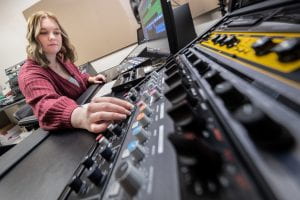Students studying for a dynamic career in audio engineering soon will have new spaces and state-of-the-art equipment at UW-Green Bay to sample and test their techniques in the ever-evolving field.
“Careers in audio production continue to grow from audio engineering and post-production to podcasting and audio for video games,” said Dr. Bill Sallak, an assistant professor in music at UW-Green Bay. “Students in the program will have a competitive edge in the marketplace by having the experience of executing work in professional-level recording facilities.”
As part of the new emphasis in the Bachelor of Arts in Music program, the University is building the Richard J. Resch Audio Production Studio, which includes a control room interconnection to one live room and two large rehearsal rooms. The remodeled spaces will be in the Studio Arts building and The Weidner Center, where there will be the ability to livestream or record performances. The studios’ acoustic quality will match the reputation of The Weidner Center’s Cofrin Family Hall.
“The dedicated studios will be built to acoustic specifications and have sound isolation between rooms, quiet HVAC handling and airlocks,” Sallak said. “It’s the kind of spaces students will find out in the field.”
Funded as part of the University’s Ignite the Future campaign, significant contributions from Richard and Sharon Resch, the 1923 Fund and Mike Haddad have accelerated construction, which is expected to begin and be completed during 2023.
Haddad, retired CEO of Schreiber Foods and current chair of its Board of Directors, said having access to a professional recording studio will be transformational for student musicians.

“One of my fellow band members had a recording studio in his home … and I saw how it gave musicians more control over their creative project,” said Haddad, who began playing guitar in 1982 and has loved playing music ever since.
“The student musicians will have this space where they can explore with their sound without worrying about the high fees to rent space at a professional studio somewhere. Students can come in, learn and experiment.”
Haddad, married to UW-Green Bay alumna Leanne Haddad (’05 Human Development), learned about the project from local musicians and instructors in his network. After speaking with Chancellor Michael Alexander, another lifetime music lover, Haddad wanted to be involved.
UW-Green Bay student Chloe Smith said the new space and equipment ensures students will be well trained for their future careers.
“The changes are very exciting. The equipment and studio space will be the same that (graduates) find out in the job market,” she said. “(The space) will definitely provide an edge for students looking for their first professional job.”
Equipment and available technologies are critical in this field, and Sallak highlighted that the project will allow UW-Green Bay to be on the cutting edge through use of Dolby Atmus, a spatial audio technology that provides immersive sound experiences, and Dante AV Ultra, a new audio and visual hardware solution.
The new facilities also will serve Phoenix Studios, which is UW-Green Bay’s podcast network, and provide opportunities for students to serve the greater good by creating advertising, music and other media for collaborating organizations.


